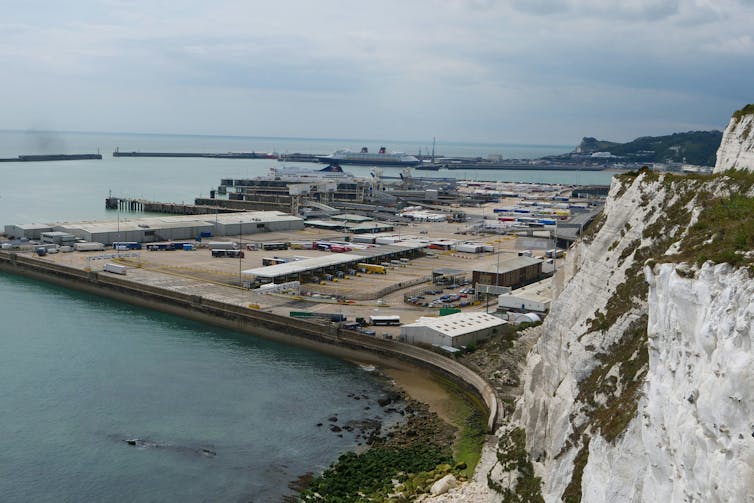New import checks on foods arriving from the EU could affect supplies at Britain’s local delis, high-street greengrocers or independent cafes. Worse, they could lead to shortages that affect the very viability of these businesses. So what are these new checks and what does it all mean for British consumers?
Three years ago, the UK departed the EU single market. This meant that the border checks applied to goods coming into Great Britain from other nations would also apply to goods from members of the EU.
The UK government had previously delayed imposing EU import checks to ease the burden on British businesses. This was largely due to financial pressures caused by Russia’s war in Ukraine, spiralling energy costs and stricken supply chains resulting from the pandemic.
However, after several years of delays, Britain is finally bracing itself for physical border checks on EU imports. The start of the year has already seen tighter controls around certification on goods entering the country from the EU.
The new border target operating model system assigns EU plant and animal products to high-, medium- or low-risk categories. Businesses importing them pay fees per product type up to a maximum of £145.
Products in the low-risk category will ultimately be charged at £10 per product line, whereas medium to high-risk categories incur charges of £29 per product line.
The next phase of this risk-based system has just launched, involving physically checking medium- and high-risk goods at the border. Recent reports suggest the checks will be phased in and will focus initially on the highest-risk products only.
But regardless, these checks are costly, requiring additional resource, time and paperwork. Ultimately, they mean that importing food from the EU is no longer a level playing field.
Britain’s short-life products are highly reliant on the short straits route where products arrive via Dover and the Eurotunnel. Around 62% of fruit and vegetables, 43% of meats and 41% of dairy products arrive from the EU through this route. The new charges associated with these products threaten to cripple small and independent importers.
The checks have dealt a blow to the operations of smaller retailers who are under increasing pressure to maintain their inventory. A small consignment of goods, with only five different products in the medium-risk category, such as poultry, milk or some fish products for example, would cost small importers £145.
There are complexities associated with the administration of these changes. The maximum charge for one consignment will be limited to five product types. If a consignment is made up of different risk categories, the rate of the highest risk category applies to all the product lines. So if a consignment contains four low-risk product lines (totalling £40) plus one medium- or high-risk product line (£29), the importer will pay the maximum charge of £145.

The infrastructure has also been called into question. There have been concerns about the capacity and design limitations of the £147 million Sevington facility, 22 miles from Dover, that has been chosen for the inspections. Ironically, while these checks are touted to enhance UK’s biosecurity, there remain concerns that moving the checks inland “creates an open door for disease and food fraud”.
Last August, the government forecast that additional checks would cost British businesses an extra £330 million per year, but a recent report puts the cost closer to £2 billion. These additional costs are likely to be passed on to consumers, potentially leading to further grocery price inflation.
Supermarket rationing has become relatively commonplace in recent times and imports categorised as high-risk may again be in short supply over the coming months. The combined effects of physical checks, higher charges and increased paperwork have already deterred EU exporters.
This ultimately affects price, choice and availability for British consumers. EU businesses are required to submit export health certificates to UK port and customs authorities 24 hours before goods arrive, adding further layers to the process. Vague rules at the border lead to delays and disruptions, affecting the availability of food on supermarket shelves.
Larger retailers, of course, are more resilient to disruptions due to their bargaining power and established supply chain networks. To compete, smaller importers may reduce the variety of their offerings by focusing on low-risk products. Or they could pass the costs on to the consumer.
Navigating a way forward
Governments should encourage farmers’ markets and local vendors to champion seasonal products. These would shorten food supply chains and reduce vulnerabilities including rising costs and carbon footprints. Governments could make training available to small businesses to help them navigate the new border processes.
As for independent, specialist and small importers, they should move away from competing only on price to provide more unique offerings. They could stay competitive by embracing ethical sourcing and using technology to streamline the bureaucracy associated with the new import checks.
Whether it’s Brexit, COVID, the Ukraine war or border controls, food shortages represent deeper cracks in how our food supply chains are operated. Business and government must fix them or we risk losing a vital part of our economy – those much-loved small businesses that make our high streets more interesting.

